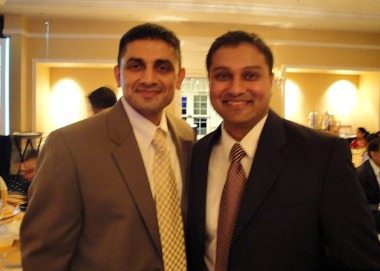
Mehul Sanghani’s business education began long before he became a student at Virginia Tech, though he didn’t realize it at the time.
As a child and adolescent, the president, founder and chief executive officer of Octo Consulting Group helped his parents and his sister run the family-owned motel in Blacksburg, Va. He, his sister and his parents lived in a 900 square-foot apartment above the office of the motel that they fully managed as a family.
“It was a very modest upbringing,” Sanghani said. “We were the maid; we were the desk clerks; there was no outside staff, we were everything,” he explained. “I’ve had a modicum of success in the last few years, but it is my very humble and entrepreneurial upbringing and that’s really shaped who I am today, shaped my perspective.”
“It was a very modest upbringing,” Sanghani said. “We were the maid; we were the desk clerks; there was no outside staff, we were everything,” he explained. “I’ve had a modicum of success in the last few years, but it is my very humble and entrepreneurial upbringing and that’s really shaped who I am today, shaped my perspective.”
This upbringing was Sanghani’s learning ground for understanding the risks, pitfalls and potential benefits of entrepreneurship and work ethic it takes to be successful.
“It certainly kept me grounded, and it’s helped to keep me motivated – instilled a bit of a chip on my shoulder, if you will,” said Sanghani. “I’ve been fortunate enough to grow up in the United States, while my parents grew up in even more meager surroundings in India. I have had an abundance of opportunities here, but seeing my parents scratch and claw, experiencing such a humble beginning, motivated me and helps keep the right perspective on any success I experience now.”
His achievements with Octo Consulting Group include recent successes at the Greater Washington Government Contractor Awards over the past couple years.
“We were nominated last year and we won two years ago, so I think the company has evolved a great deal,” he said. “We have focused very heavily on putting in place the infrastructure and capabilities needed to be competitive when we’re no longer a small business.”
Octo Consulting Group participates in the U.S. Small Business Association’s 8(a) Business Development Program, a program that the company hopes it will graduate from early in the next few years. Sanghani refuses to use the program as a crutch.
“A lot of firms look at the 8(a) program as an enabler, but we really haven’t,” Sanghani said. “We view the program at face value, it is a business development program and business development catalyst for certain firms. We lead with our capabilities, the things we do exceptionally well and have strong past performance in – we feel it’s a much better way to forge credibility.”

Sanghani is a Virginia Tech alumnus, and touts love for both his Hokies and his hometown.
“There’s a huge sense of pride that I think accompanies folks that go to Virginia Tech,” he said. “I honestly believe that the people that call Virginia Tech their alma mater have a much stronger sense of community than I’ve observed with a lot of other alums.”
“There’s a huge sense of pride that I think accompanies folks that go to Virginia Tech. I honestly believe that the people that call Virginia Tech their alma mater have a much stronger sense of community than I’ve observed with a lot of other alums.”
Perhaps this sense of community among fellow Hokies spurs from the university’s rural setting. Or, maybe it’s an accumulation of the types of personalities that seek out the school. However they came together, Sanghani is truly invested in seeing his fellow alumni succeed. Executives like Mark Weber, president of the U.S. Public Sector at NetApp; Simone Acha former founder and CEO of iLuMinA Solutions (acquired by ECS Federal in 2012); Sonu Singh, president and chief executive officer at 1901 Group; and Paul Lombardi, president and chief executive officer TeraThink Corporation come to mind.
“These are folks that I have a kindred spirit with because we went to the same school, but also because the school environment helped shape the same sense of community. I think there is an overlapping philosophical outlook amongst VT alums that shapes how we want to run our businesses, too,” he said.
Sanghani readily acknowledges the mentors who have shaped him into the entrepreneur he is today. One particularly influential force on his life was Suneet Gupta, a cousin by marriage.
Gupta, the founder of Guident Technologies, took Sanghani under his wing, passing on his knowledge about leadership, the government marketplace, and business in general.
“Unfortunately, Suneet passed away unexpectedly several years ago, but a lot of lessons he taught me helped shape me and helped guide the direction I tried to forge at Octo. In his honor, we have one of our conference rooms named after him, and his picture sits on my desk every day. He was a very influential force for me early on and I’m grateful for the guidance he passed along.”

Most recently, Octo has focused on bringing a new layer of leadership to the firm, investing heavily in its business development function and growing its proposal operations function, which is critical in winning opportunities.
Laying a foundation for success includes utilizing a matrix organization that allows the company to focus on key customer segments, Sanghani said. He explained that there are vertical organizations within the company as well as horizontal divisions that focus on technology solutions in the firm’s core areas of agile software development, data visualization, and data analytics, as well as a management consulting division. The firm also recently launched an internal R&D division known as “O.Labs” to incubate technology products and solutions for its customers. Some of the firm’s vertical segments include civilian, intelligence community, civilian health and the national security segment focused on FBI customers, he noted, adding that the setup allows the company to tailor its capabilities to reach individual customer missions.
“People know character when they see it and if it’s lacking, it’s very difficult for folks to follow. There has to be that inherent trust and character that folks feel is omnipresent in order to be effective.”
Octo’s major goals for the coming year are customer-oriented and include evolving and building tighter relationships with customers in the company’s core segments. The team is setting its sights not just on differentiated services, but on bringing truly innovative technology solutions and products to market for customers with its O.Labs effort.
Octo’s customers play an integral role in the company’s success. Several are licensing a product that Octo’s O.Labs initially rolled out as a proof of concept – today, this product is being deployed globally by the same customer. Sanghani wants to bring two additional products to market this year with the same success, and the company is investing a seven-figure sum to make it happen.
“We want to take advantage of our agility in the marketplace and bring that type of innovation to market for our customers. We have strong past performance, but we also want to leverage O.Labs to bring innovation that reduces costs of operation for our customers. In today’s environment, efficiency is the new innovation,” he said. “Overall, we’ve spent a lot of time and energy trying to identify what the firm will be when we’re both no longer in the 8(a) program and when we’re no longer a small business.”
Looking beyond the 8(a) program, Sanghani understands that reinvesting in the business and its human capital assets is vital. Some people treat their business as an ATM, he said, and don’t reinvest in their employees and the organization’s strategic future.
As Sanghani learned in the early days, back when it was just him and his family running that small motel, two qualities ultimately define a leader: character and competency. As Sanghani learned then, and later witnessed from his mentor, Gupta, and his parents, you need both to be successful.
“I know people define character differently, and it’s an intangible thing, but it’s an important leadership trait that can’t be understated,” he said. “It doesn’t matter how tangible it is. People know character when they see it and if it’s lacking, it’s very difficult for folks to follow. There has to be that inherent trust and character that folks feel is omnipresent in order to be effective.”
As for competency, Sanghani believes it can only be achieved if people are buying into the terms a leader is offering.
“If you have both character and competency,” he said, “I think as a leader you will always have the ears, the hearts and the minds of the folks th at you’re trying to lead.”
at you’re trying to lead.”
Related: Burgeoning Hokie Network Boasts Interconnectedness

